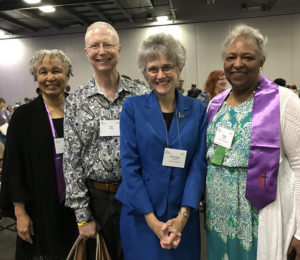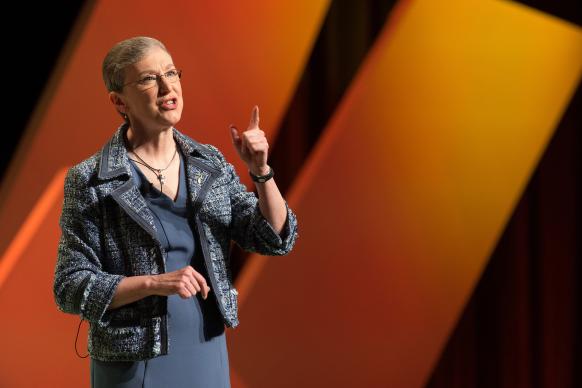
|
By Kathy L. Gilbert
COLUMBUS, Ohio | UMNS
Story republished from umc.org.
“Sisters, we are the bold energy of God,” Harriett Jane Olson said to more than 6,000 United Methodist Women who had spent three days listening and learning to harness the power of bold.
Olson, top executive of United Methodist Women, was speaking at the final session of the 2018 Assembly held May 18-20. “The Power of Bold” was the theme for gathering.
“I believe United Methodist Women is as needed today as it has ever been,” Olson said. “We are in a position to make a change; we are everywhere; and we are connected.”
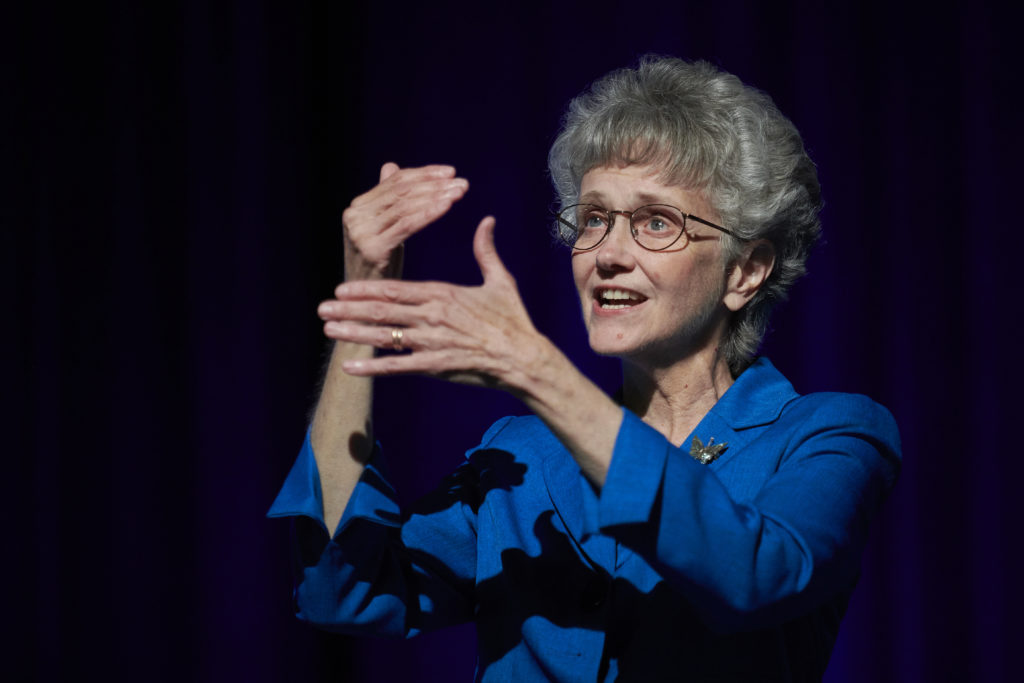
Bishop Peggy A. Johnson signs during a May 18 session of the United Methodist Women Assembly 2018 in Columbus, Ohio. Photo by Paul Jeffrey for United Methodist Women.
The assembly focused on four main social justice issues United Methodist Women are concentrating their work on — economic inequality, climate justice, maternal and child health and mass incarceration with an emphasis on stopping the cradle-to-prison pipeline.
Olson paused and said, “I would add a fifth — gender equality.”
She was referring to two amendments to the denomination’s constitution that failed. Both dealt with gender equality. There will be a revote on one amendment after a determination that the wrong language was sent to annual conferences.
Dawn Wiggins Hare, top executive of the Commission on the Status and Role of Women, joined Olson on the stage May 18 to talk about their disappointment and determination to keep working.
“This is not who we understand The United Methodist Church to be,” Olson said, as the two women tearfully addressed the assembly.
“When we come back to this — and we will come back to this, we will be stronger for working together,” they said in unison.
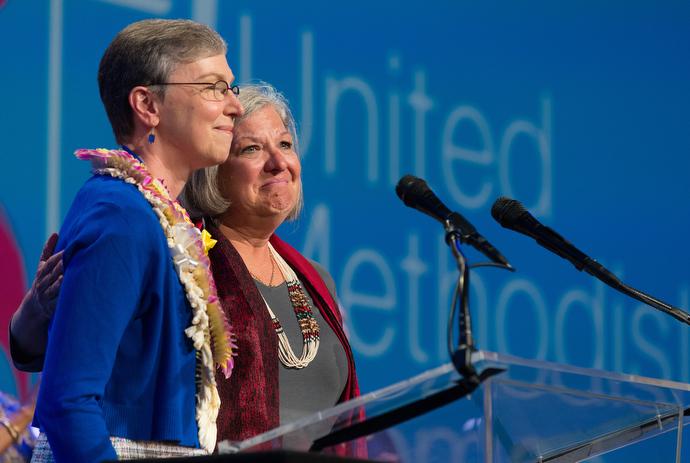
Dawn Wiggins Hare (right), of the United Methodist Commission on the Status and Role of Women, becomes emotional as she and Harriett Jane Olson lament the failure of two amendments to the church’s constitution that promoted women’s equality. Photo by Mike DuBose, UMNS.
Olson was joined by Louisiana Area Bishop Cynthia Fierro Harvey in a press briefing before the final plenary. The briefing included nine women bishops and Bishop Gregory Palmer, host bishop from the West Ohio Conference.
“We need to tell the stories of our work,” Harvey said. “No woman should ever hear, ‘That was a pretty good sermon for a girl.’”
Work needs to be done to rebuild the foundation, Olson said. “The progress we thought was secure is not.”
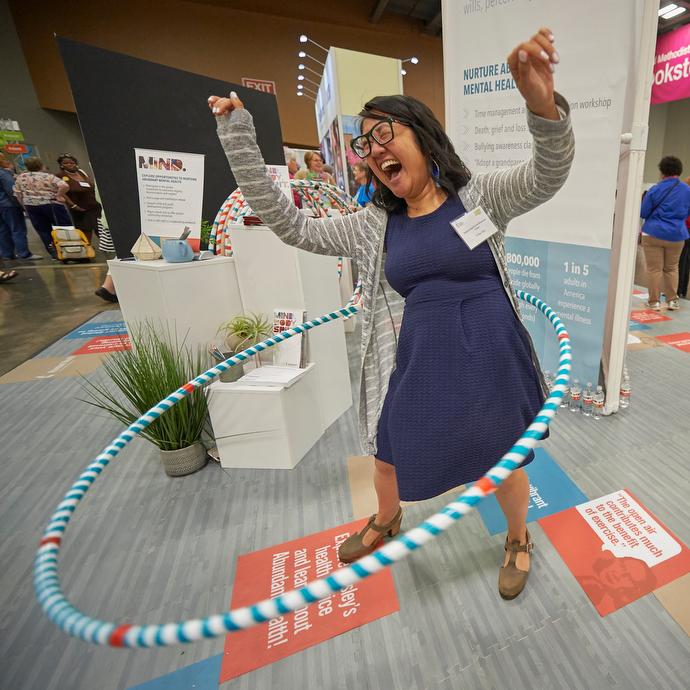
The Rev. Shalom Agtarap uses a Hula-Hoop at a health exhibit in the exhibit hall of the assembly. Photo by Paul Jeffrey for United Methodist Women.
Workshops, town halls, exhibits and presentations filled the three-day assembly. In between all the activities, the women talked and established new relationships and celebrated seeing old friends.
“This is so exciting. I am inspired to be bold and speak up,” said Liwliwa Robledo, a retired deaconess from the Rocky Mountain Conference. She spoke of the diverse gathering, all with the same calling, “to love justice and service and serve Christ.”
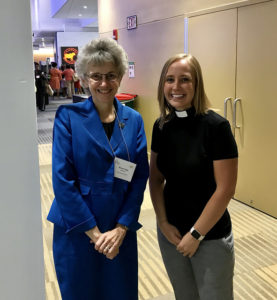 Bold women like Nobel Peace Prize winner Leymah Gbowee, climate scientist Katharine Hayhoe, award-winning author Michelle Alexander and Children’s Defense Fund founder Marian Wright Edelman were on the program. Speakers also included Tamika D. Mallory, nationally recognized civil rights activist, and the Rev. Hannah Adair, a United Methodist pastor dedicated to amplifying the voices of young women, talked about the cost of being bold.
Bold women like Nobel Peace Prize winner Leymah Gbowee, climate scientist Katharine Hayhoe, award-winning author Michelle Alexander and Children’s Defense Fund founder Marian Wright Edelman were on the program. Speakers also included Tamika D. Mallory, nationally recognized civil rights activist, and the Rev. Hannah Adair, a United Methodist pastor dedicated to amplifying the voices of young women, talked about the cost of being bold.
Gbowee, a native of Liberia, won the Nobel Peace Prize for her role in leading a women’s peace movement that brought an end to the second Liberian Civil War in 2003. She shared the award with Liberia’s former President Ellen Johnson Sirleaf, a United Methodist, and Yemen native Tawakkol Karman.
“Seven of us with $10, boldly sat down and made a plan of a nonviolent way to bring our country back to normalcy,” she said. “The drive that kept me going was my faith in God.”
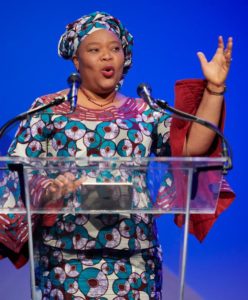
Activist Leymah Gbowee addresses the assembly. She received the Nobel Peace Prize in 2011 for her work in leading a women’s peace movement that brought an end to the Second Liberian Civil War in 2003. Photo by Paul Jeffrey for United Methodist Women.
Gbowee said she never decided on a career choice.
“I was called by God, and he who put the work in me will perfect it. I am a daughter of glorious Jesus.”
Hayhoe is a scientist and a Christian. While she said people think that is a strange combination, she believes it is “essential.”
“If we believe God created this amazing planet then what is science but trying to figure out what God was thinking?” she asked.
Mountaintop removal, fracking and air pollution are killing the planet and people, she said. And the poorest people are most harmed, she said.
She applauded the United Methodist Women’s letter-writing campaign to Mike Wirth, the new CEO of Chevron. The campaign demands that Chevron take important steps toward fixing their leaks, stopping new natural gas projects, and investing in renewable energy.
She told the women one of the best ways they can help is to talk about climate justice in their churches and communities.
Alexander and Edelman addressed mass criminalization and the cradle to prison pipeline.
Two million people are behind bars, and 30 million to 70 million are branded as felons and stripped of their legal rights including voting, Alexander said.
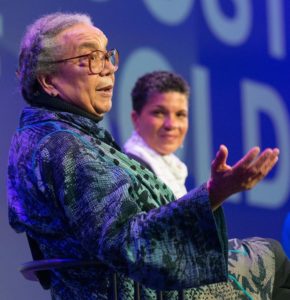
Marian Wright Edelman (left) takes part in a discussion of the “cradle-to-prison pipeline” with Michelle Alexander during the assembly. Edelman is founder and president of the Children’s Defense Fund, and Alexander is author of “The New Jim Crow: Mass Incarceration in the Age of Colorblindness.” Photo by Mike DuBose, UMNS.
“And don’t forget millions who are being deported,” she said.
Edelman said children should not be the poorest group of people in the world.
“Every child needs early education, and a fair start. United Methodist women could end poverty. Y’all are bigger than the NRA. Stop gun violence,” she added. “Let’s finish this job for Dr. Martin Luther King Jr.”
In a town hall meeting, Clara Ester, a United Methodist deaconess, also echoed the call to continue King’s legacy. Ester, who fought for desegregated schools, said the country has returned to all white, all black and all brown schools again. She urged churches to help.
“Churches are failing our schools. We need to embrace the village. We have to embrace all God’s children,” she said.
Nyonnah Attoh, a member of George Patten United Methodist Church in Liberia, said the speakers inspired her to be bold.
“The speeches empowered me to have the courage to speak out, no matter what, no matter where I am from,” she said. “I am asking myself, ‘What do I do to make a difference?’”
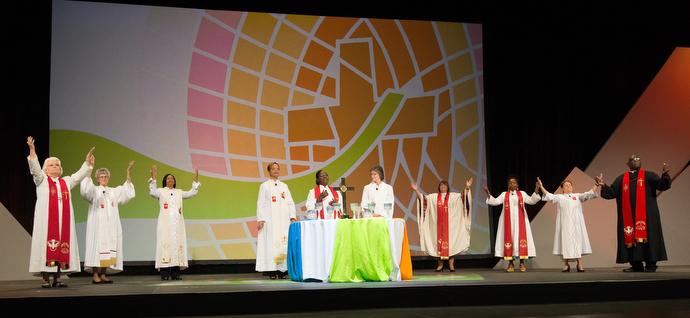
Bishops preside over a service of Holy Communion during closing worship at the assembly. Photo by Mike DuBose, UMNS.
Jeanne Long, president of the West Ohio Conference’s United Methodist Women, said Clara Ester’s testimony made her cry.
“The rally on Thursday for a living wage was powerful, and it was fantastic to see Bishop (Gregory) Palmer at the consecration of deaconess and home missioners,” Long added.
United Methodist Women celebrated their 150th birthday with a cake, songs and the consecration of 24 deaconesses and home missioners from across the United Methodist connection. These are laypeople called by God to be in a lifetime relationship in The United Methodist Church for engagement with a full-time vocation in ministries of love, justice and service.
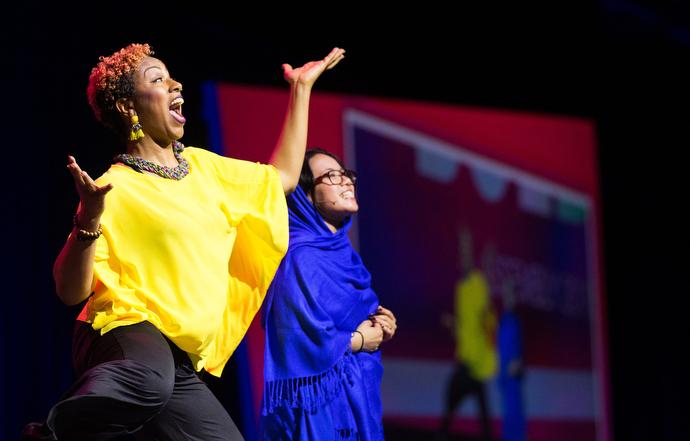
A dancing angel Gabriel, played by Alexandria “Brinae Ali” Bradley, visits the young Mary, played by Summer Dawn Reyes, during opening worship at the assembly. Photo by Mike DuBose, UMNS.
Throughout the assembly, Summer Dawn Reyes, spoken-word performer, as well as Alexander Bradley and Dolores Sanchez, tap dancers, brought the story of Mary, mother of Jesus, alive on the stage.
“I loved the music, the different types of being bold we learned about, the speakers, the dancers — were so inspiring,” said Delores Carhee, North Georgia Conference.
Limitless Teens, young United Methodist Women, were among the assembly participants.
Ainise Isama’u, Valerie Hungalu and Soana Fieeiki, from the California-Pacific Conference, said Limitless Teens is bridging the gap between older and younger women in the church.
“Elders bring such a great foundation, and we are taking that into bold action,” Isama’u said.
Olson told the women that relationships are important but she warned close bonds do have a downside.
“It is hard to let new sisters in, we need to broaden the circle.”
She asked the participants to do three things:
- Understand United Methodist Women are leaders and “do more than bring the cookies”
- Invite new voices
- Recommit to mobilize for justice.
“Advocate on at least one of the justice issues we have talked about. Now is not the time to rest, we must use our own bold action to say yes to God.”
The next United Methodist Women’s Assembly will be May 20-22, 2022 in Orlando, Florida.
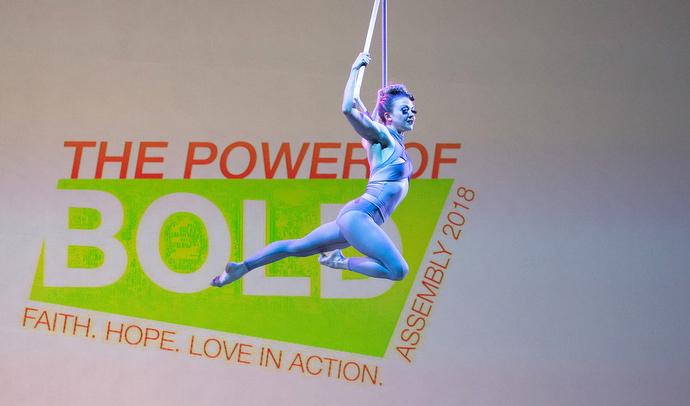
Aerial dancer Elizabeth Ross Fraley from the art collective Quixotic glides past the logo for the assembly during the event’s closing worship service. Photo by Mike DuBose, UMNS.
Story republished from umc.org.
Read related story, Women act in faith, ‘pass out grace.’
See more images from the 2018 United Methodist Women’s Assembly on their Flickr page.
Gilbert is a multimedia reporter for United Methodist News Service. Contact her at 615-742-5470 or newsdesk@umcom.org. To read more United Methodist news, subscribe to the free Daily or Weekly Digests.

